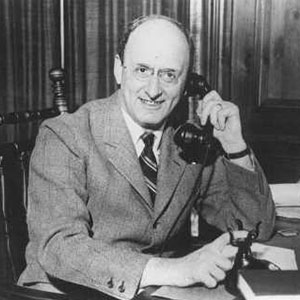Henry Morgenthau Jr served as Treasury Secretary during the administration of Franklin D. Roosevelt. In his role, Morgenthau was a central figure in financing FDR’s New Deal programs, as well as the United States’ entry into World War II.
Early Life
Morgenthau was born on May 11, 1891, in New York City, into a prominent Jewish family. He attended Cornell University for two years, where he studied architecture and agriculture. He never graduated, electing to buy 1,000 acres of land in Dutchess County, New York, and become a farmer. In 1922, Morgenthau purchased the American Agriculturist magazine, where he served as editor.
Morgenthau’s farm was located near FDR’s Hyde Park estate, and the two men became close friends. During FDR’s term as Governor of New York, Morgenthau served as state conservation commissioner and as chairman of the governor’s agricultural advisory committee. When Roosevelt was elected President in 1933, FDR named Morgenthau governor of the Federal Farm Board. When health issues forced Treasury Secretary William H. Woodin to resign, FDR appointed Morgenthau to take his place.
U.S. Secretary of the Treasury
Morgenthau served as Treasury Secretary for more than a decade. His challenges included financing FDR’s ambitious New Deal programs and meeting the country’s growing obligations in World War II. During his tenure as Treasury Secretary, he directed the spending of $370 billion, which was triple the amount of money overseen by his 50 predecessors combined.
Morgenthau also played a key role in shaping the Roosevelt Administration’s foreign policy, advocating on behalf of aiding Jewish refugees and adopting the Lend-Lease policy. In 1944, he proposed the “Morgenthau Plan,” which aimed to prevent Germany from every waging war against the Allies by crippling its major industries. Although it was ultimately rejected, the plan did influence U.S. occupation of Germany in the wake of World War II. In 1945, Truman signed occupation directive JCS 1067, which directed the U.S. forces of occupation to “… take no steps looking toward the economic rehabilitation of Germany.”
Among his other significant accomplishments, Morgenthau served as President of the Bretton Woods Conference, which established the International Monetary Fund and the International Bank for Reconstruction and Development, more commonly known as the World Bank. Due to philosophical disagreements with President Harry S. Truman, Morgenthau resigned from the Treasury in July 1945. He dedicated the rest of his life to several Jewish philanthropies. Morgenthau died in 1967.








